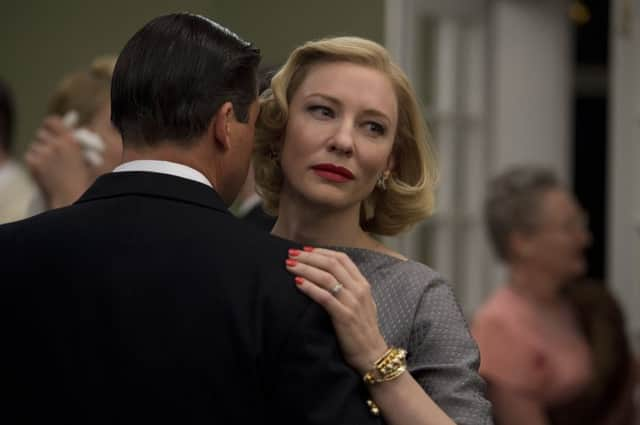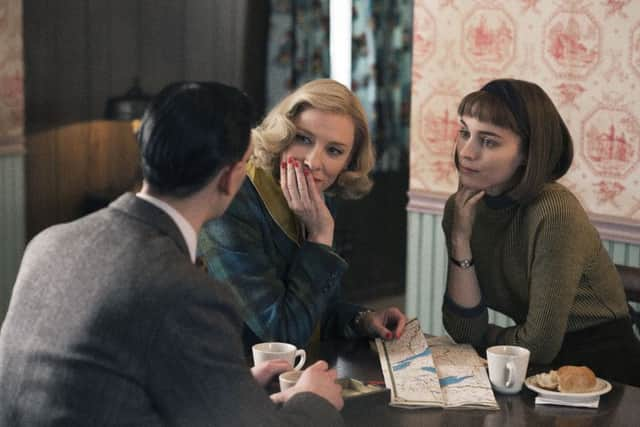Carol, a New York love story with salt ‘n’ sauce


TODD Haynes is trying to recall why he got so excited about reteaming with Cate Blanchett for his new movie Carol. He’d cast her before, as the wiry, androgynous, amphetamine-fuelled Bob Dylan cipher Jude Quinn in his wildly experimental, multi-character Dylan “biopic” I’m Not There – a film Dylan loved incidentally. But when Carol was offered to him with Blanchett already attached, the chance to go from the craziness of that experience to casting her as a wealthy and alluring 1950s housewife who falls for a New York shopgirl (played by Rooney Mara) was, he says, too good to pass up.
“When she played Jude in I’m Not There she’d dropped lots of weight to lose the hips; she was just a stick,” he recalls. “And then all of a sudden I thought, ‘She’s got curves and she has this voluptuous beauty’ and it just made me excited to create Carol with her.”
Advertisement
Hide AdThe contrast is striking in another way. In I’m Not There, Blanchett’s casting was designed to be provocative; in Carol – which is based on Patricia Highsmith’s pseudonymously published 1952 novel The Price Of Salt – it’s not. From the moment Carol (Blanchett) and the virginal Therese (Mara) lock eyes across the shop floor of a New York department store, the film proceeds to explore the intensity of their romantic involvement without turning it into an issue movie.


This was part of the appeal for Haynes, who got his start as a leading light of the New Queer Cinema movement of the early 1990s, but has also distinguished himself as a director with a particular affinity for crafting nuanced dramas about women (he gave Julianne Moore her first headline role in his second feature Safe and directed Kate Winslet in the HBO mini-series Mildred Pierce).
“What turned me on about the book,” he says, “was that it made love, regardless of your sexual orientation, a pathological condition: you’re over-reading every piece of evidence coming your way to determine your fate and you end up in this crazy, hyper-productive narrative state, cut off from the world, cut off from reality – like a criminal.”
In Carol, the 1950s setting and the taboo of same-sex relationships merely provides modern audiences with a plausible context for understanding why neither protagonist can throw caution to the wind. “All love stories need that social obstacle or barrier that keeps people from having full fruition of their feelings for each other,” says Haynes, “but increasingly it becomes harder to imagine in the western world why two people couldn’t be together. I think that’s why stories like Carol or Brokeback Mountain are exciting people about the genre again.”
Still, it seems odd it should have taken this long for LGBT content in movies to stop being “controversial”. When Haynes made his glam rock drama Velvet Goldmine back in 1998, the explicit gay content still came as a shock to people, even though it was ostensibly about David Bowie, whose sexual ambiguity had helped make him one of the biggest rock stars in the world 25 years earlier. And even a decade ago, Ang Lee’s aforementioned Brokeback Mountain was considered a career risk for Heath Ledger and Jake Gyllenhaal, despite Christian Bale and Ewan McGregor having already gone from Velvet Goldmine to starring roles in Batman Begins and Star Wars respectively.


“Ewan got cast in Star Wars while we were working on Velvet Goldmine,” says Haynes. “It’s funny, I always forget there’s such a massive Star Wars crowd and that’s how they think of Ewan.”
Advertisement
Hide AdDoes he have a theory about why movies have lagged so far behind other art forms in terms of accepting LGBT content as a part of the broad spectrum of life?
“It may be that we’re just always moving forwards and backwards at the same time in little circuitous steps, particularly around certain issues. Obviously there has been tremendous progress in tolerance around gay and lesbian issues, over the last decade in particular, and especially with representations on television. I think that’s all contributed to the domestication of the gay buddy/friend/sister/brother/whatever, which is quite distinct from the climate of HIV and Aids that ushered my career into existence. There was a different kind of status of queerness then that’s sort of gone away with all the advances that we’ve seen.”
Advertisement
Hide AdIndeed, Carol has much more in common with Brief Encounter – the structure of which Haynes consciously borrowed and references in the film – than it does with his Oscar-nominated 2002 drama Far From Heaven, which used the visual style of Douglas Sirk melodramas from the 1950s to draw attention to the way film has traditionally coded issues of sexuality and race. Both are a long way too from the more out-there narrative choices deployed in the likes of Velvet Goldmine (which began with the alien birth of Oscar Wilde), or Haynes’s debut film, the radical gay-themed sci-fi triptych Poison (1991).
“That’s the trade off,” he says. “You lose that kind of radical, critical, outsider perspective. But these rights need to be upheld and legislated and made the law of the land. And for every kid coming out, that’s of paramount importance. So, it’s a give and take, and you lose some things as well.”
If the broadening of mainstream tastes has started making Haynes seem accidentally respectable though – not to mention in-demand (he has a film about Peggy Lee on his slate and before that will direct Wonderstruck, an adaptation of the graphic novel by Hugo author Brian Selznick) — he can take pride in the fact that he’s recognised as the creator of one of the most suppressed films ever made: Superstar – The Karen Carpenter Story.
Shot using Barbie dolls in place of actors, the experimental film (which he made in 1988) occasionally pops up online in bootleg form, but objections from Richard Carpenter and copyright issues regarding the music mean Haynes has never been able to release it officially.
“We haven’t returned to the legal discussion around the film, so I don’t have any updates on it,” he says. “But in a funny way that has contributed to the meaning of the film, because very few things are unavailable now. And I’m quite proud of the fact that that film defines me. In a way it consolidates all the themes of all my features in one package.” n
• Carol is on general release